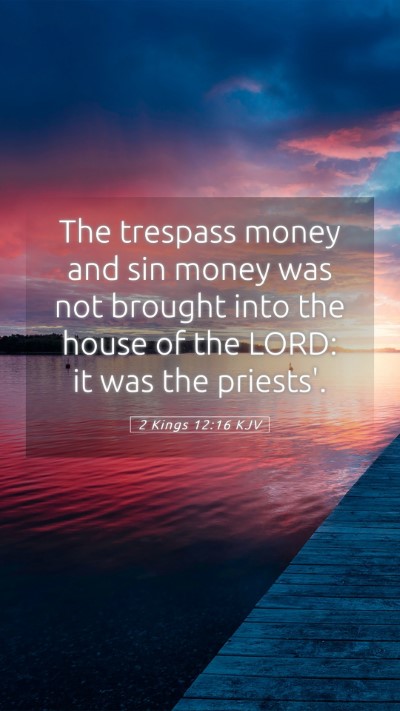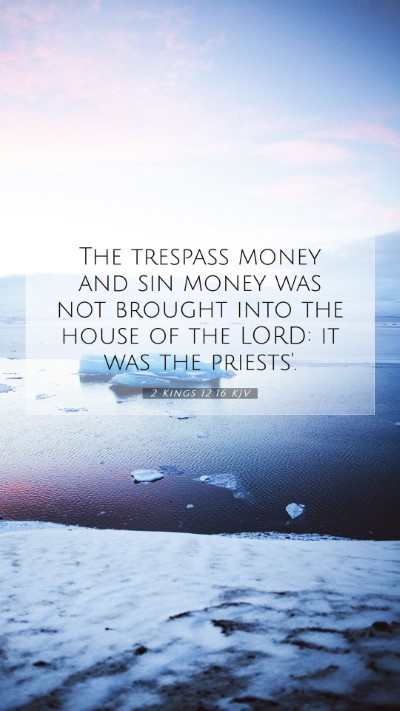Old Testament
Genesis Exodus Leviticus Numbers Deuteronomy Joshua Judges Ruth 1 Samuel 2 Samuel 1 Kings 2 Kings 1 Chronicles 2 Chronicles Ezra Nehemiah Esther Job Psalms Proverbs Ecclesiastes Song of Solomon Isaiah Jeremiah Lamentations Ezekiel Daniel Hosea Joel Amos Obadiah Jonah Micah Nahum Habakkuk Zephaniah Haggai Zechariah Malachi2 Kings 12:16 Meaning
What is the meaning of 2 Kings 12:16?
The trespass money and sin money was not brought into the house of the LORD: it was the priests'.
2 Kings 12:16 Bible Verse Meaning
Understanding 2 Kings 12:16
Bible Verse: 2 Kings 12:16 - "The money that is offered in the form of a guilt offering or a sin offering was not brought into the house of the LORD; it belonged to the priests."
Overview
This verse provides insight into the financial responsibilities and roles of the priests in ancient Israel. It indicates the distinction between offerings made for atonement and other types of monetary contributions. Understanding this verse is vital in gaining a deeper appreciation for the workings of the temple system and the priests' administration.
Verse Explanation
Commentaries provide a rich analysis of this verse, illustrating its context and implications:
-
Matthew Henry's Commentary:
Henry emphasizes that this verse highlights the proper allocation of offerings. The offerings for guilt and sin are designated exclusively for the priests, reinforcing their role as mediators between God and the people. By stipulating that these funds should not enter the treasury of the Lord, it underscores the importance of using designated funds for their intended purposes.
-
Albert Barnes' Notes:
Barnes notes that the distinction made in this verse reinforces the holiness of the offerings and their direct connection to atonement. He suggests that this regulation was put in place to maintain the sanctity of the offerings and to ensure that they are utilized properly for the priests as they carry out their sacrificial duties.
-
Adam Clarke's Commentary:
Clarke points out that the funding for the priests derived from specific offerings affirmed their livelihood and service in the temple. He interprets this verse as a part of the broader system of offerings designed to sustain the religious leaders and maintain the temple's operations, suggesting that proper management of these resources is essential for the worship system.
Insights into the Administrative System
This verse forms a crucial part of the understanding of Israel's worship practices in the Old Testament. It highlights important administrative details regarding offerings used within the temple system:
Biblical Context
In the broader narrative of 2 Kings, this verse reflects the ongoing issues concerning temple restoration and proper worship according to the Law. It provides insights into the responsibilities of the priests and the significance of their roles within the religious community.
Significance of Offerings
Understanding the specific types of offerings and their purposes is essential for anyone seeking Bible study insights or biblical exegesis. These offerings indicate varying degrees of sin and guilt, illustrating God's provisions for atonement and the seriousness of personal and communal sin.
Application and Relevance
This verse challenges modern believers to reflect on the principles surrounding giving and resource management within religious communities. Its application may extend beyond financial matters to include spiritual responsibilities and the manner in which resources are allocated in service to God.
Cross References
This verse is related to other passages in the Bible that discuss offerings and the roles of priests:
- Leviticus 5:15-16: Describes guilt offerings and their intended purpose.
- Numbers 18:8-10: Relates to the priest's portion of offerings and their sacred duties.
- Malachi 1:6-8: Addresses proper worship and offerings, underscoring the need for genuine service.
Conclusion
In summary, 2 Kings 12:16 serves not only as an administrative guideline for the ancient temple but also as a reminder for modern readers regarding the integrity and intent behind religious offerings. It encourages believers to think critically about how they engage with their faith and the resources available to them.
Further Study
For those involved in bible study groups or pursuing online Bible study, this verse can be a focal point for discussions on the nature of offerings, the priesthood, and the relationship between God and His people. Consider exploring other related topics for a comprehensive understanding.


